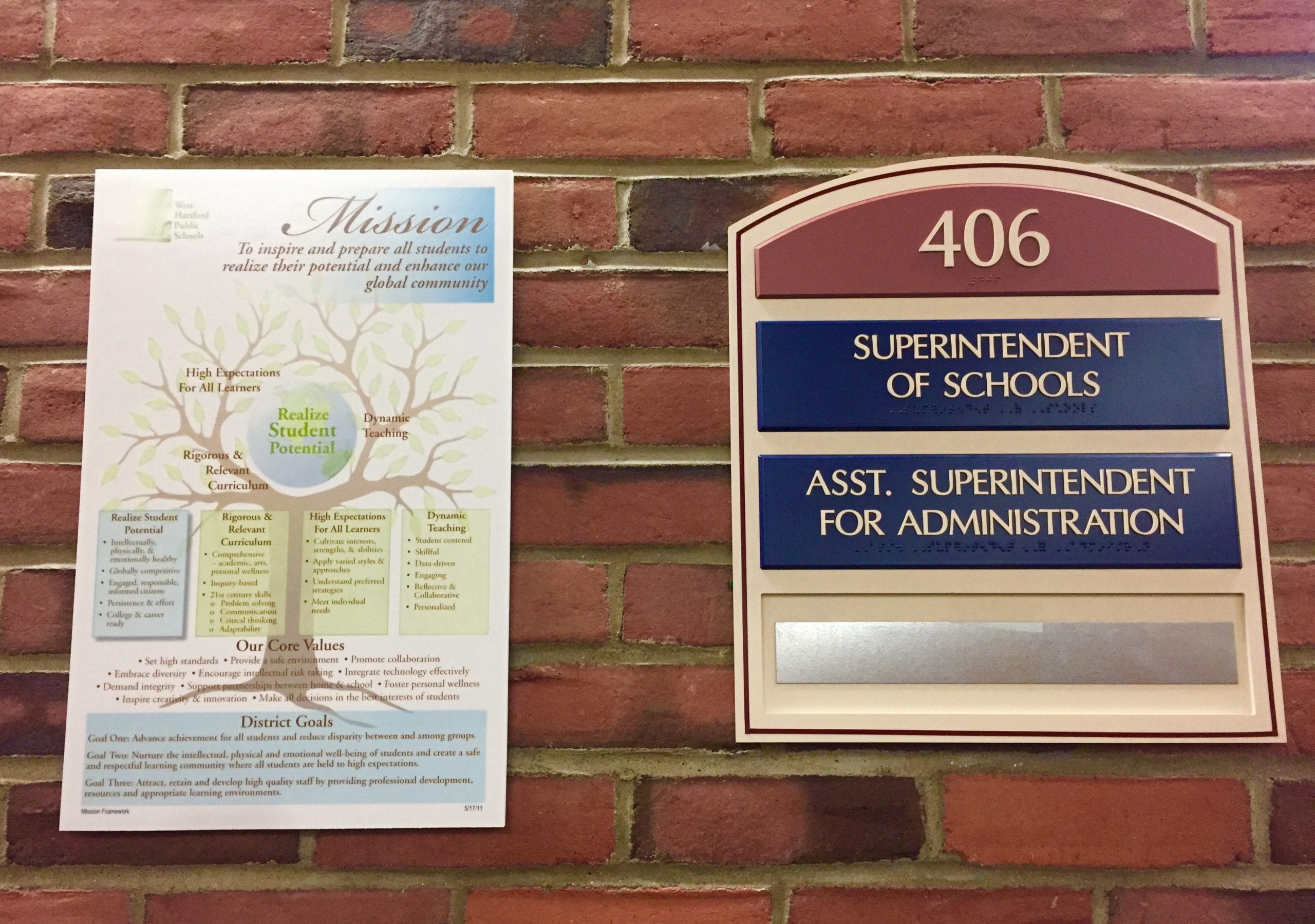Board Approves Capital Improvement Plan with Acceleration of Air Quality Upgrades for West Hartford Elementary Schools

Audio By Carbonatix

West Hartford Public Schools Superintendent's Office. Photo credit: Ronni Newton (we-ha.com file photo)
The West Hartford Board of Education approved its Capital Improvement Plan last week, with plans to implement air quality improvements in the elementary schools much faster than originally contemplated.
By Ronni Newton
The West Hartford Board of Education voted Feb. 2 on the Capital Improvement Plan (CIP) submitted by Superintendent Tom Moore at its previous meeting, and unanimously adopted the plan with an acceleration of planned upgrades to the air quality at the district’s elementary schools.
The CIP approved for FY 2021-22 will remain $6,734,000 as submitted by Moore. That figure is less than the FY 2020-21 figure of $7,640,000, because most of the work enhancing school security has already been completed.
But while the initial CIP proposal submitted on Jan. 21 planned on an expenditure of $8,228,000 for FY 2022-23, another $2,500,000 million is being added to that amount, following the Board’s decision to upgrade air quality at the district’s elementary schools two at a time over the course of 10 years, rather than spreading the project out over 20 years.
A 12-year CIP plan is submitted, but only the first two years of the plan are approved each year by the Board.
The increased focus on fresh air circulation due to COVID-19 has made the project more of a priority, Assistant Superintendent Andy Morrow told the Board. The focus is no longer just about the temperature inside classrooms, but about air flow.
Morrow said that as part of the plan for reopening schools for this academic year amid the COVID-19 pandemic, districts were encouraged to do HVAC assessments. The assessment cost roughly $250,000. “The benefit of that is that it really gave us a solid understanding of our systems,” he said.
Air conditioning and air quality enhancement have been a topic of discussion by the Board of Education nearly every year as part of the process of approval of the CIP, and in 2020, when it was clear that window replacement at some of the elementary schools was critical, the Board decided to include not just window replacement and airflow enhancement, but also the installation of air conditioning at the nine elementary schools that currently do not have it.
Both high schools and all three middle schools have air conditioning, but of the elementary schools, only Charter Oak International Academy and Smith STEM are fully air conditioned.
Seven of the 11 elementary schools have no fresh air handling systems, Plant and Facilities Manager Bob Palmer said.
The need is most critical at Duffy Elementary School, which is two stories and includes the original windows and ventilation system dating back to its construction in the 1950s. Duffy – as well as Webster Hill, which opened in 1949 – will be the first to receive the upgrades, which will be made over the course of two summers.
Aiken and Norfeldt will likely be the next two schools, Morrow said.
“It’s a valuable investment we ultimately feel that we need to make in our buildings and in our schools,” he said.
The work must be done over the summer when school is not in session, and Palmer said each building will take two summers to complete.
It would not be feasible to do the work on all of the elementary schools at once, Palmer said. Not only would it be a $40 million project, but it would not even be possible to secure enough contractors to handle the work, he said.
The district initially planned to spread the work out over the course of 20 years to spread out the costs. “Since then things have changed a lot with school fresh air and systems,” Palmer said.
Board member Mark Zydanowicz asked if it made sense to plan to do the air quality work at all schools since enrollment is projected to decline. “If 10 to 15 years from now have to close a school, how is that taken into account as a priority?” he asked.
Morrow said that while declines are projected, and there is no crystal ball, there will be plenty of time for future boards to make those decisions and at the same time undertake any redistricting that would be needed if a decision is made to close a school.
“We’re going under the assumption that these are long-term buildings as they’ve been in many cases for 50 years,” Morrow said. Making these investments are part of being long-term stewards of the property.
The schools that will have the air conditioning installed first are definitely ones that need to have the work done.
Moore added that enrollment changes come in waves and are not continuous, typically running in 20-year cycles. We appear to be about halfway through the current decline and enrollment may increase after that, he said.
Provided the CIP is approved by the Town Council, which will officially adopt the town’s budget on April 26, the air quality improvement work will be scheduled to begin in the summer of 2022. Board member Amanda Aronson asked about any possibility of starting the work this summer rather than waiting.
Morrow said that’s not possible, but the acceleration will allow two schools rather than just one to have the first phase done in the summer of 2022.
“We appreciate the consideration of our colleagues on the Town Council for this proposal,” Board Chair Deb Polun said.
Like what you see here? Click here to subscribe to We-Ha’s newsletter so you’ll always be in the know about what’s happening in West Hartford! Click the blue button below to become a supporter of We-Ha.com and our efforts to continue producing quality journalism.




[…] — air circulation, heating and cooling systems at nine of its 11 elementary schools sailed past the school board on an unanimous, bipartisan vote earlier this […]